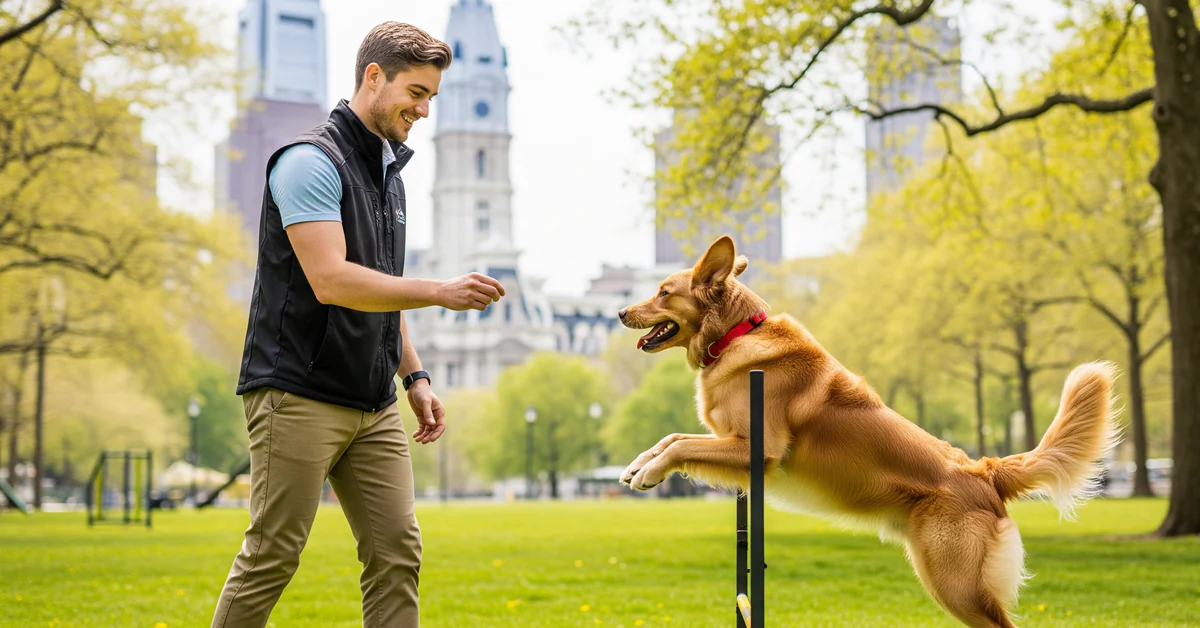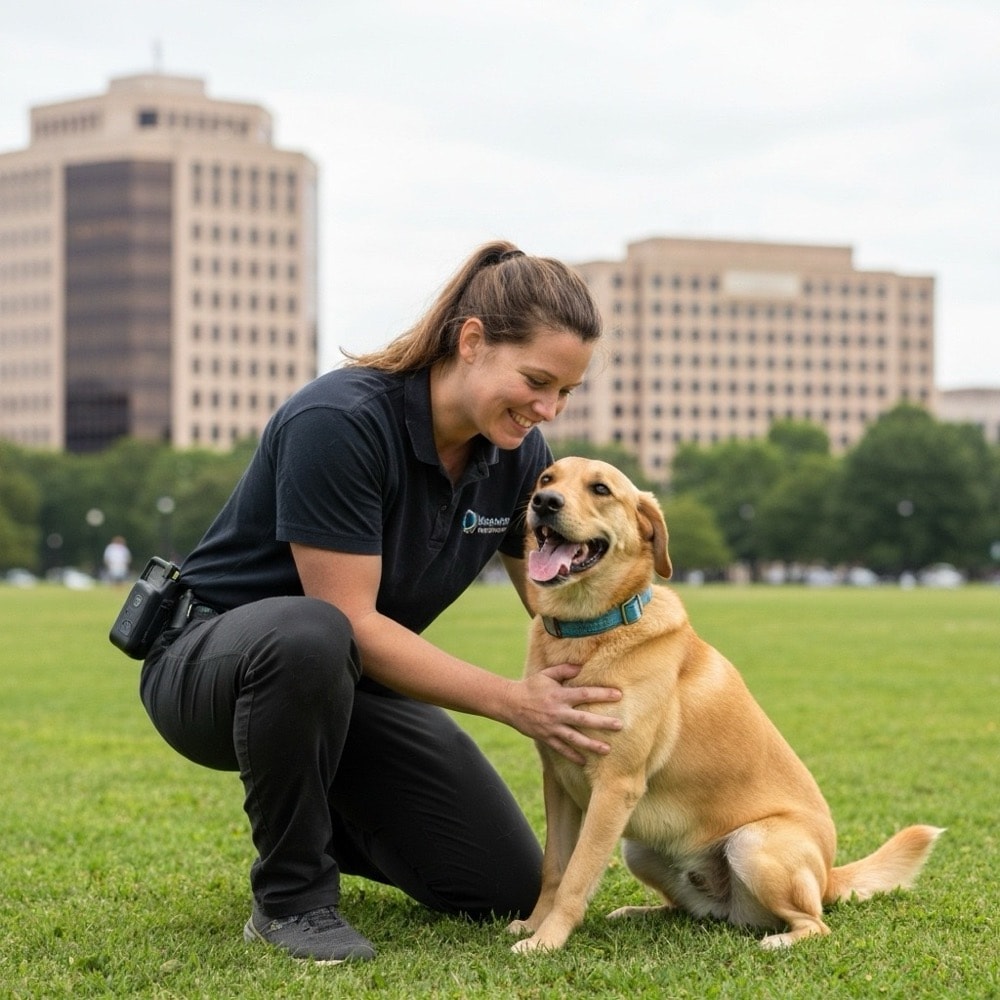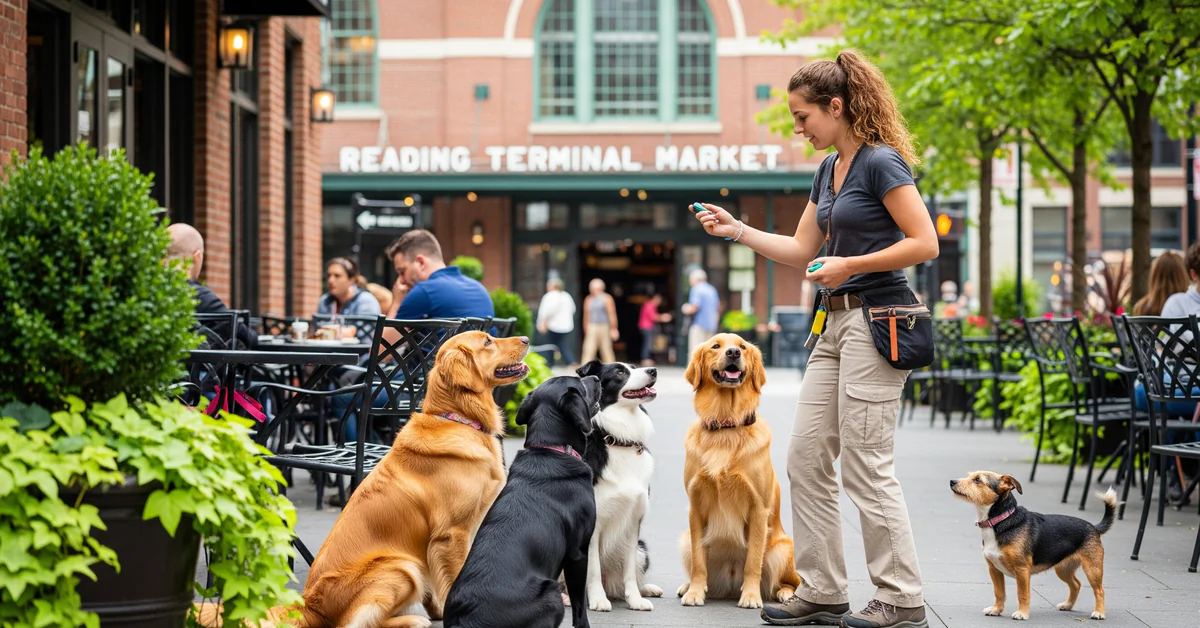Your Complete Guide to Choosing a Dog Trainer in Philadelphia
Walking your dog down South Street or through Rittenhouse Square shouldn’t feel like a battle. But if your pup pulls toward every person, lunges at delivery trucks, or barks at dogs from apartment windows, you’re not alone.
Philadelphia’s narrow sidewalks, busy intersections, and close-quarters living create unique challenges for dog owners. The right trainer understands these daily realities and helps you build skills that actually work in Center City chaos.
What Makes a Good Philadelphia Dog Trainer
The best trainers here know that a “sit” learned in a quiet training room means nothing if your dog can’t do it while a SEPTA bus rumbles past. Look for someone who practices in real environments where your dog needs to succeed.
Ask about their education first. Solid trainers hold certifications like CPDT-KA, KPA-CTP, or behavior credentials such as IAABC-CDBC. These letters show they’ve studied how dogs actually learn, not just old-school dominance myths.
More importantly, listen to how they talk about your dog’s problems. Good trainers explain why your dog acts out and create a plan that makes sense for your daily routine. They don’t promise overnight fixes or blame you for “letting your dog be the alpha.”
When you meet potential trainers, ask how they’d handle your biggest frustration. If your dog goes crazy when the neighbors walk by, a good trainer will explain counter-conditioning and give you homework that starts small. If they suggest prong collars or “showing your dog who’s boss,” keep looking.
Training Methods That Actually Work in the City

Positive reinforcement isn’t just feel-good fluff. It’s the most effective way to teach dogs new behaviors, especially in distracting environments like Philadelphia streets.
Here’s why it works: When your dog learns that good things happen when they pay attention to you, they’ll choose to focus on you instead of that interesting trash can or barking dog. This builds confidence and creates behaviors you can count on when it matters.
For dogs who are scared or reactive, trainers use gradual exposure techniques. They’ll help your dog see triggers like skateboards or other dogs from far enough away that your pup stays calm, then slowly decrease that distance over many sessions while pairing those triggers with treats.
Puppy training focuses heavily on city-specific skills. Your little one needs to walk confidently over subway grates, ignore food scraps on sidewalks, and settle calmly in crowded spaces. Good puppy programs also teach apartment manners like quiet time and appropriate play.
Avoid trainers who rely on fear or pain. Methods like leash jerking, shock collars, or “alpha rolls” might suppress behavior temporarily, but they often create bigger problems down the road. In a busy city where your dog faces stress daily, you want training that builds their confidence, not breaks it down.
What You’ll Pay for Dog Training in Philadelphia
Training costs vary widely based on the trainer’s experience and your dog’s needs. Here’s what most Philadelphia owners can expect to pay:
| Service Type | Average Cost (Philadelphia Area) |
|---|---|
| Group classes, 4 to 6 weeks | $180 – $350 |
| Private lessons, 60 to 90 minutes | $120 – $225 per session |
| Puppy training package, 4 to 6 lessons | $450 – $800 total |
| Day training, trainer works your dog + handoffs | $500 – $1,200 per week |
| Board and train, 2 to 4 weeks | $2,200 – $5,000 total |
| Behavior consult for fear, reactivity, or aggression | $150 – $300 initial session |
Private lessons give you the most bang for your buck if you’re dealing with specific behavioral issues. Your trainer can address your dog’s exact triggers and teach you handling skills in your neighborhood.
Group classes cost less and provide built-in distractions for practice, but they move at the group’s pace. If your dog is reactive or fearful, you might need private sessions first.
Board and train programs sound appealing, but remember that your dog needs to transfer those skills to real life with you. The most expensive option isn’t always the most effective.

Philadelphia’s Rules Every Dog Owner Should Know
Understanding local laws helps you avoid fines and keeps training sessions legal.
Leash laws are straightforward but strictly enforced in busy areas. Dogs must be leashed and under your control everywhere except inside designated dog runs. This includes all city sidewalks, parks, and the popular Schuylkill River Trail.
Dog licensing in Phili is required for all dogs over three months old. You can get annual or lifetime licenses through the Philadelphia's dog license program. Keep your license and rabies tags on your dog during walks.
Rabies vaccination is mandatory under Pennsylvania state law.
Noise complaints are common in dense neighborhoods. If your dog barks excessively, neighbors can file complaints through the city’s noise complaint system. Training can prevent these issues before they start.
If you’re planning to practice in parks, check with Philadelphia Parks & Recreation first. Some locations require permits for organized training sessions.
Why Credentials and Insurance Matter
Pennsylvania doesn’t require dog trainers to be licensed, which means anyone can hang out a shingle. That’s why checking credentials and insurance becomes your job.
Professional certifications show that a trainer has studied current learning theory and committed to ongoing education. Look for credentials like CBCC-KA for behavior cases or CTC for complex issues.
Liability insurance protects both you and the trainer if something goes wrong during a session. Reputable trainers carry insurance and will share proof when asked. This is especially important if they’re working in public spaces or with reactive dogs.
Don’t be shy about asking for credentials. A confident, qualified trainer will be happy to discuss their education and approach.
Questions That Help You Choose the Right Trainer
Before you commit to any program, ask these questions:
- What methods do you use, and why? Listen for explanations based on learning theory, not dominance myths or quick fixes.
- How do you handle setbacks? Training isn’t always linear, especially with behavior issues. Good trainers adjust their approach when something isn’t working.
- What’s your experience with my dog’s specific issue? A trainer who’s helped dozens of reactive dogs will have more tools than someone who mostly teaches basic obedience.
- Where do we practice? The best trainers work in environments where your dog actually needs to behave well.
- What support do I get between sessions? Look for trainers who offer phone or text check-ins when you’re struggling with homework.
- How do you measure progress? Vague promises aren’t helpful. Good trainers set specific, achievable goals and track your dog’s improvement.
Great Places to Practice Around Philadelphia

Once your dog has some basic skills, these spots offer controlled environments for real-world practice:
The Schuylkill River Park Dog Run provides double gates and separate areas for different play styles.
Seger Dog Park in Washington Square West offers a well-maintained space right in Center City.
Orianna Hill Dog Park in Northern Liberties has been a community hub for years.
Here are other official dog parks authorized by Parks & Rec:
- Black, Coyle & McBride Playground — 2150 E Huntingdon St., 19125.
- Columbus Square — 1200 Wharton St., 19147.
- Lanier Park — 1600 S 29th St., 19145.
- Mario Lanza Park — 214 Catharine St., 19147.
- Pretzel Park — 4300 Silverwood St., 19127.
- Winter Street Greenway — 2100 Winter St., 19103.
For leash training, start on quiet residential blocks before tackling busy areas like the Delaware River waterfront or South Street. Early morning and late evening offer the most manageable practice conditions.
If your dog struggles with other animals, contact ACCT Philly for behavior resources and low-cost training referrals.

Common Questions About Dog Training in Philadelphia
How long does training take?
Most families see improvements within a few sessions if they practice daily. Basic manners typically take 6 to 8 weeks to become reliable, while behavior issues like reactivity or separation anxiety need longer, more gradual work.
Can reactive dogs use dog parks?
Not until they can pass other dogs calmly on leash first. Dog parks can make reactivity worse if your dog isn’t ready for off-leash interactions.
What if my dog is afraid of city sounds?
Start with recordings played softly at home while feeding treats, then gradually increase volume and move to real environments. This process takes patience but creates lasting confidence.
Should I bring my whole family to training sessions?
Yes, if everyone will be handling the dog. Consistency between family members speeds up progress and prevents confusion.
What vaccinations does my dog need?
Beyond the required rabies vaccine, your vet may recommend additional shots based on your lifestyle and local disease risks. Keep vaccination records handy for training classes and dog park visits.
Can I train my dog myself?
Basic skills like sit and stay are definitely doable on your own, but behavior issues and city-specific challenges often benefit from professional guidance. A few sessions with a good trainer can save you months of frustration.
Philadelphia’s urban environment creates unique challenges, but also unique rewards. When your dog can walk calmly past food trucks, settle quietly in outdoor cafes, and greet neighbors politely, you both get to enjoy everything this city offers. The right training makes that possible.
